UBO – Steve Rasnic Tem
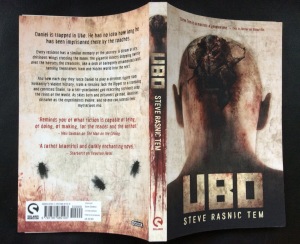
SOLARIS 2017
My previous reviews of Steve Rasnic Tem HERE.
When I real-time review this novel, my comments will be in the thought stream below….

www.nemonymous.com
Des Lewis - GESTALT REAL-TIME BOOK REVIEWS
A FEARLESS FAITH IN FICTION — THE PASSION OF THE READING MOMENT CRYSTALLISED — Empirical literary critiques from 2008 as based on purchased books.

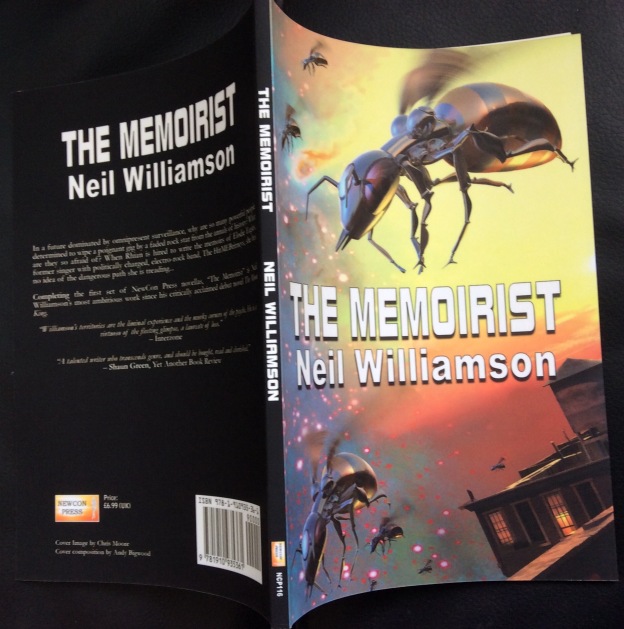

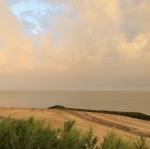

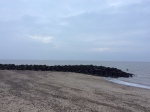
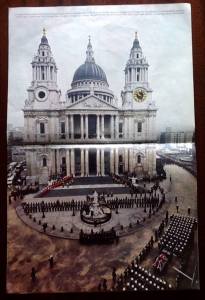 “She shook her head and said, ‘Never trust a do-gooder,’ disliking as always the connection between righteousness and weather-proof walls.”
“She shook her head and said, ‘Never trust a do-gooder,’ disliking as always the connection between righteousness and weather-proof walls.” “…It was as if he looked not up into the vaulted sky, but down at the surface of a lake with sunlight on its ripples.”
“…It was as if he looked not up into the vaulted sky, but down at the surface of a lake with sunlight on its ripples.”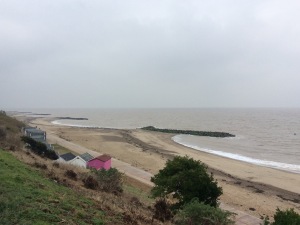 THESE LAST TIMES OF REBELLION
THESE LAST TIMES OF REBELLION
Not so much heading into Hotel Deadfall, not so much adopting a rôle in Alfred Jarry’s Père Ubu, not even so much evolving your own personality while in alien contact or anonymous capture of Chiang-Evenson-Kafka’s Warren, but it is certainly Tem’s vision for our Times. With roughly Roach-like guards.
Daniel has famous nicknames for his fellow human prisoners in this giant chitinous Roach-ridden Warren, as I shall call it, but a Warren Where and Why. Alien abduction of all these variegated-aged men from earth? Rôle-playing famous historic villains from Earth as some sort of experiment? I am captured, nay, captivated, evolving my own personlity as reader or a standpoint as its real-time reviewer, as I am drawn into this cloying scenario as potential gestalt yet to be clinched in some future hindsight….
And there is the smell of this place, too. And more.
“Killing America, one bullet at a time.”
As I go through this seemingly subsumptive novel, I am not intending to spoil things by itemising each rôle play with which Daniel is apotheosised – assuming this book is constituted thus? – but the second chapter is indeed an apotheosis of Daniel by the mind of a killer, a famous killer with a gun, one of those killers who were, earlier last century, rare but now, today, increasingly home-grown, a killer who apotheosises himself as a boy, as presumably apotheosised by the ‘roaches’ as a means of control? I am feeling my own way in this warren, too. And I shall try to let you feel your own way, too, alongside me as another reader, alongside all such exponential readers. Mayhem revealed as well as transcended?
(of Falstaff’s dying words as reported by a character in Shakespeare)
3
“We live in Hell but we aspire to Heaven — that’s the drama of being human.”
We learn more of what I called the Warren, except it is not a warren, and I will not speak lightly of it again; other readers need to explore it for themselves and call it what they think most appropriate without any influence from me.
We catch glimpses of Daniel’s backstory before he was brought here for rôle scenario playing, vicious rôles of real people from real history where he becomes the person involved. One day he may play the part you once played or are about to play. Not a doppelgänger so much as a tranche of your self. Your self, not yourself.
Gender stereotypes discussed…. man as monster.
Playing around in the text at the moment as if it is a reader’s sandbox. Forgive me.
The earlier reference to smell of the place, Under Body Odour?
“It was as if his new persona had eaten him.”
Smells, and all.
“…making him look like he was always smelling a bad smell.”
A few wayward en and em dashes, too. One false return.
There is some staggering prose here, that takes us into the mind of Daniel’s latest rôle scenario, complete with doppelgänger boy or lad, an as yet tantalising concept, full of the atmosphere of a genius loci, a historical point in time and place that coincides with a similar period in part of an inchoately kindred book (The Essex Serpent) I happen to be concurrently real-timing and dreamcatching here.
There are some gory scenes and nightmarish pursuances in this section of the Tem. And you wonder, when involved in this latest sandbox of imagination and imputed historic truth, whether you are Daniel or a Roach or the rôle itself, and what is the cause and effect (or synchronicity?) of history being instigated before your eyes by this book rather than by history itself, whether the rôle retrocauses, via the Roaches, what has already happened in your past, as adumbrated by your time’s history books and primary sources? A dead-body-tunnel-birth rationale for madness? I think I already called this book ‘subsumptive’…whichever gender you are. So far, male. Man as inimical to women, to those who birth them, to those who love (or sell their love to) them, too? Or have themselves opened up?
“Have you heard the expression, ‘Meat is murder’?”
We glimpse more of Daniel’s backstory on Earth before coming to Ubo, involving his marriage and his son, a son seen tellingly in interface with a boy, the only boy, on Ubo. There are many quotable and germane quotes in this relatively short chapter, but I shall resist quoting them, so that you see them first in the book itself.
Also tellingly (and amazingly), I now need to link this book again with another concurrent real-time review, this morning’s review of a Mauro story here, where meat is murder and the discovery of the bird in the Tem. The accidental links between the two are manifold!
I often think, the more I do this gestalt dreamcatching of hyper-literature, the more it works! By not only substance but also flashpoints of time.
“…about the lies of Vietnam.”
Strong stuff.
I remember listening live and in person, towards the end of the 1960s, to Adrian Mitchel reciting his famous poem: “Tell me lies about Viet Nam.”
Meanwhile, regarding soldiers in combat, Daniel “skipped through the heads like a stone thrown by a boy across a dark and deceptively still pond.” Encroached from the side of his head or his mind, in whatever soldier rôle he ‘played’, by roaches like, for me, those feelers and squiggles at the side of old films…
Here, you do not become the instigator of a massacre but one of its components, with the ‘boy’ as poignancy-feed.
There is also the Earth meat and “body mayonnaise” of the gestalt of my concurrent real-time reviewing.
“the goddamned God of Mayhem.”
“So why do they repeat these scenarios?”
Another inter-mission, a scenario-between, back at Ubo base, when one of your (Daniel’s) nicknamed co-residents echoes now, at length of speech about his marriage back home, my earlier mention above of the en and em dashes and false hard-return, with his own speech peppered with impedimental em dashes. This pattern on the page echoes his remembered trials and tribulations as part of a couple’s edges rubbing along together through life, a rôle-playing cubism like Picasso’s, when you place your own long-term relationship on the page or on the canvas, that canvas-between, before embarking again on those roach-induced scenarios of subsumption as someone else, someone famous, someone ostensibly evil. There are so many profound considerations below this text, I dare not try to broach them all.
This seems to be a major work, awakening things that perhaps should not be awakened? UBO, UBO, WHO GO there?
“Ubo isn’t a sentence.”
A phrase, then? Unidentified Being Object? (Be being a verb like fly.)
This chapter makes mr think these captured beings are as if upon a holiday cruise or coach tour to foreign climes, bonding with each other, finding out things gradually about each other’ backstories on Earth, if they are indeed still not on Earth. Comparing notes on rôle scenarios they have experienced, like tourists comparing excursions away from the main body.
Here, you meet a woman on the roof of Ubo where everyone gathers between scenarios, a woman who has played the subsumptive rôle of, inter alios, Bonnie Parker, but her interrupted backstory of her own life that she tells you is far more frightening….
I think we readers have had our backstories interrupted at the precise moment we picked up this book and started reading it, midway in some dire cliffhanger of life to which we may never return? The most frightening thought of all.
You do realise, don’t you, that some never have a return, whether soft or hard, from scenarios…and you may never see them again. We readers need to compare notes about this book, triangulate its coordinates like the good gestalt Dreamcatchers we surely are, I say!
“The words made rubble in his head until he could make better sense of them. I’m finished. I’m finished. I can trust no one, even myself.”
Your next rôle scenario is one that puts yourself inside the head of a historical character that might make it easier to empathise prophetically with another historical figure today? Tellingly tied up with the broken effect of the earlier em dashes now symbolised by Cyrillic ….. and a Kafkaesque roachification…? And the act of dying as an unidentified-being-object imagining that others are dying instead.
This is, again, major stuff. Literature as empathy for perhaps the first time in its real sense?
“A great leader was a Lord of Mayhem. […] They simply did not understand how a leader must be, what he must do.”
“Belief could be a great thing — people did heroic things because of belief. Belief without generosity, without compassion destroyed people.”
…as if my suspension of disbelief is now shattered, my need to continue this book countered by some authorial tricks to prevent those readers without the right sort of belief from continuing, strung between two of Ubo’s co-residents, Lenin and Falstaff (Daniel’s nicknames for them, not characters for rôle scenarios), each of them telling the same backstory of perhaps America’s Trumpish Bible Belt in parallel, one a devil’s advocate, the other the devil itself? Or just ordinary people trying to make the most of their lives through belief, albeit based on backstories of religious (Christian) belief? Back-of-the-neck stories, not just backstories, where the button to be pushed is situated?
Another helldump interruptus?
And the howling of the distant werewolf is what? Or who? Only the so-called real world’s current history may eventually tell us what or who, or this book’s future story may tell us, a story yet to be read, if you can get past this chapter.
I have babbled of green fields?
“Instead of a well-insulated trip directly into another life, he’d gone off floating through pools of personality, random bits of lives cut short, meaningless squiggles of biography.”
And indeed you feel the same, as if editing has ceased, or perhaps never started, and the effects are being felt now. Or it is an emblem of this book’s artifice of truth, where the darkest period of 20th century history is now tried on for size, and your becoming one leading player in that scenario…
Like Daniel, it made you feel you wanted to get out of this literary or empathic journey.
“Daniel could tell that he was less into this part than normal, his consciousness only partially absorbed.”
So, if you want to jump, now is the time to jump? Before experiencing the ultimate horror. Those eyes that looked straight at you.
“A paleness beyond pale.”
“I turned my back on my religion and set out to pursue my own demons, the demon Barron, specifically.”
Shakespeare’s Falstaff gets another quote, in the text this time and not just from my review.
Roaches, upon your renewed journey through UBO, are given a “problem-solved” credit as DIY men off to the local DIY store in our world, I guess. A Bosch-like vista, though, not just a makeshift building to house the rôle-scenarioists, and a mural. And a character called Henry caught in his own rôle scenario, even upon a hard return to UBO and incarceration, with or without fur matting his skin, or roach-chitin as bone or even an em dash as synapse. Henry is stuck with real historical stuff that will send any reader mad or at least over-anguished, showing that you are not the only one living in an era of accretively buried mass child abuse; there was worse in St Joan’s era, Gilles and Boys.
Your own backstory, too, of your own son and boy, a boy who was weak-hearted but manic in child’s play with you as ticklish father, nevertheless. The boy that partially haunts this book.
A powerful book where the word ‘powerful’ is genuinely not powerful enough to describe it. But what word is?
“I don’t want to hear this story anymore!”
“Okay. Please haul me in.”
More fascinating speculation on – and adeptly graphic description of – the nature and whereabouts of Ubo, and what the acronymic letters of the name might represent. The Thoreau in us all, our own backstories, some of which have not yet finished as backstories. Only hindsight can clinch anyone’s gestalt. And possibly hindsight never ends?
The empathy and meaning of existential self-consciousness and what we need to do to make our mark. Like the author writing this book? Like my writing this empathic series of reviews as tentacles embedded within the special nature of hyper-imaginative fiction authors and their eventual labyrinth of connections and fused futures?
All such ambitions are as tenuous as fiction itself. This fiction, included.
None of us will be found under a car park and be called Richard III. Or perhaps one of us will be. The name of that hunchbacked King, mentioned in this text before I just mentioned it here, would fit in neatly as a character in UBO as well as this mere reference to him as a dead body. We shall see…
I babble of concrete fields.
“‘All that drama with Henry, it really upset him.’
Falstaff nodded and let go.”
Not Richard III but Henry IV?
“…and a distant babble of musical voices.”
This is not Shakespeare, now, but something from an even stronger imagination that is perhaps also based on historical truth and drama. ‘The God of Mayhem’ him- or itself, where Daniel for the first time seems trapped in conscious synergy with the latest rôle scenario of Mayhem, where this rôle simply knows that Daniel is witnessing events from within him or it! This is now strong and powerful stuff *exponentialised*, and only your reading it will do justice to it, but, meantime, is the Machiavellian ‘boy’ called Barron or Bannon, I ask? Is this God of Mayhem Trump him- or itself, without perhaps being intended to be any such thing, this book having I guess been long in the pipeline and first published early in January 2017 before Trump became President? Not America First but “the last sorry pieces of America.” Blakean as well as full on classic European visionary. “Why, I hear there isn’t even a Brussels anymore!” …. “The overcoat came on…” Even long enough to hide his feet. I guess his hand gestures seemimgly chitinous? Just watch him. The word “massage” is used in this text as well as “Mayhem”.
“The bug who would inherit the earth.”
“The boy laughed. ‘You are such a liar! Who do you think you’re talking to? I’ve been with you since the beginning!'”
“‘There’s a peculiar thing with the scenarios that are more or less in real-time,'”
“The lights flickered. An electrified twitter travelled through the residents.”
I do not dare (in more ways than one of daring) impart how this book now develops, viz. the infection of previous rôles now in retrocausation, or bad dudes and bad hombres from history in more than just mutual infection, coming into the real-time proper by climbing the metaphorical wall between experiment and experimenters. Nor dare I impart just HOW bad they are. Nor dare describe something beyond a different sort of ‘infection’ warded off from a young son in Daniel’s backstory, bordering on Ligottian anti-natalism, a backstory become an imputedly true (what I called earlier above) back-of-the-neck story, with chitin bone, in the tail end of this epochal chapter, assuming articulation within ‘devices’ just a bit more than wirelessness.
16 – 20
“In the late afternoon dimness, the roof had become a broad field of prairie grass,…”
…of which Falstaff had babbled? But at the end his green fields remain or turn back to “white or pale grey.” Ironic and poignant. Specially as we are now visited with a version of the green fields upon which the concentration camps were built. And this whole book, for me, has represented a ‘concentration’ camp. In the true meaning of concentrating, willing the self into being, with all its backstories. The ultimate question: was it a CHOICE of backstories? Or an experiment in Roi Ubu’s Mayhem-pataphysics as a metempsychosis invented by Jarry?
‘The Unidentified Being Object’: that is my expression, not the book’s. I’ll leave you to judge whether the book itself encourages that interpretation, or a preternatural vision unintended by the freehold author or by the author’s leasehold protagonist called Daniel.
This last section of chapters I am here amassing as a single unit, because I do not want to issue the ultimate plot spoiler, if indeed this IS the plot itself or fake news… I tend to see these provocative end-sections as a sort of apocryphal coda that you can read or not, leaving the climactic visionary novel proper at the end of 15. In my view, a truly great novel up to that point and still is beyond it. It is never too late to clinch the gestalt by hindsight, even the blocking of memoirs, and I now know why I instinctively linked it earlier to the concurrent review of ‘The Memoirist’ with its ‘probabilistically congruent’ electronic media or a ‘probability cascade’. Here in the Tem: “You’re not here because you’re a bad person. It’s based on probabilities, and hundreds of character traits.” And that’s how you come out of this literary work, feeling that about yourself, or at least I have done.
And there are of course the horror visions in this book, appreciable for their own sake, second to none, I say.
And the sheer poignancy of your concentration to re-find the true self and those you loved. “And yet I ache for…” And the doubt you got it all wrong.
And the doubt I got it all wrong, too.
“‘You’re not in Hell. You’re in the future we’ve made for ourselves.’
‘Are you a prophet?'”
“I’m so sorry.’ He was weeping. ‘You were never supposed to know. This was never supposed to happen.'”
end